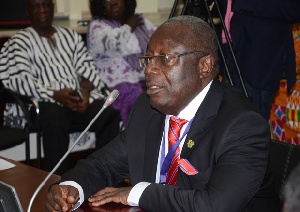 Dr Kwaku Afriyie, Minister of Environment, Science Technology and Innovation
Dr Kwaku Afriyie, Minister of Environment, Science Technology and Innovation
As Ghana joins the world to celebrate the International Day for Biological Diversity (IDB) the Minister of Environment, Science, Technology and Innovation, has tasked enforcement agencies to prosecute those who destroy natural resources.
Dr Kwaku Afriyie, in a statement to commemorate the Day, on Saturday, said human activities, such as encroachment on wetlands by residential and industrial developers must concern all citizens.
“We cannot continue to look on while citizens encroach such areas and build on wetlands, causing flooding and wanton destruction of property, and sometimes the loss of lives.
" We must enforce the laws. This means that Ministries, Departments and Agencies must formulate and implement appropriate policies.
"Metropolitan, Municipal and District Assemblies must ensure enforcement and adherence to their bye-laws, ensure effective waste management and adherence to building regulations.”
The statement, copied to the Ghana News Agency, in Accra, said human existence hinged on biodiversity and thus urged the relevant bodies to do all in their power to safeguard nature and its services.
It said:“In coastal Ghana, there are over 100 lagoons, estuaries and wetlands, which are rich in biodiversity.
"Due to their international importance as transit locations for migratory waterfowls, five of these wetlands - Keta, Ada Songor, Sakumono, Densu Delta and Muni-Pomadze - have been designated as RAMSAR sites."
The RAMSAR Convention of 1972 emphasises the wise use of wetlands.
According to world wildlife.org, "Biodiversity is all the different kinds of life you’ll find in one area—the variety of animals, plants, fungi, and even microorganisms like bacteria that make up our natural world.
"Each of these species and organisms work together in ecosystems, like an intricate web, to maintain balance and support life. Biodiversity supports everything in nature that we need to survive: food, clean water, medicine, and shelter."
Ghana’s rich biodiversity, the statement said, contributed greatly to the economy in terms of job creation, incomes for local communities, foreign exchange earnings through forest products exports, as well as providing ecosystem services.
The conservation and sustainable use of biodiversity resources, it said, could serve as a catalyst for growth and transformation of the national economy when given the necessary attention.
It, therefore, urged stakeholders, including civil society organisations, to work together with the government and its agencies to educate the public on the importance of conserving nature for current and future generations.
The IDB is marked to reflect the day of the final agreement on the text of the convention and the essence of the celebration was to increase awareness at the local, national and global levels of man’s dependence on nature and its resources.
This year's theme for the celebration is: “We are part of the Solution”.
"Biological Diversity or biodiversity is is the basis of sustenance of mankind on earth," it said.
"In signing on to the Convention, Ghana committed to implementing all the Articles enshrined in the agreement.
"The CBD objectives hinge on the principle of conservation, sustainable use of biodiversity, and equity in the utilization of genetic resources".
The statement said, the focus of the celebration in Ghana, this year was on wetlands.
The occasion would be used to highlight the need to employ nature-based solutions to protect wetlands, which were under extreme threat from urbanisation and industrial development, encroachment, pollution, environmental degradation and the destruction of fish and wildlife habitats, it said.